Overview
The article titled "8 Key Insights on Diagnosis for Autism: Pros and Cons" offers a compassionate exploration of the advantages and disadvantages associated with obtaining an autism diagnosis. It draws attention to the fact that while a diagnosis can pave the way for improved self-acceptance and access to vital support services, families often encounter significant financial burdens and emotional challenges throughout the diagnostic journey. This underscores the importance of fostering a balanced understanding of its implications, encouraging readers to consider both the potential benefits and the hurdles they may face.
Introduction
In a world where autism awareness is increasingly recognized, navigating the complex journey of diagnosis can feel both daunting and transformative. With approximately 5.4 million adults living with autism in the U.S., the need for comprehensive support systems has never been more pressing. ASD Media stands at the forefront, empowering parents and professionals alike with vital resources and insights designed to enhance the implementation of ABA therapy.
As families grapple with the intricacies of autism diagnosis, the emotional and practical implications of this process come into sharp focus. From fostering self-acceptance to addressing financial burdens and accessibility challenges, understanding the multifaceted landscape of autism diagnosis is crucial. This exploration delves into the benefits and drawbacks of receiving an autism diagnosis, illuminating the profound impact it can have on individuals and families as they navigate this pivotal moment in their lives.
About ASD Media: Empowering Parents with Resources for Autism Diagnosis
At ASD Media, we are dedicated to enhancing the application of ABA therapy by providing essential resources and insights for parents and professionals navigating the diagnosis for autism process. With approximately 5.4 million adults living with developmental disorders in the U.S., the need for effective support systems is more crucial than ever. The CDC reminds us, "As awareness and understanding of the spectrum condition continue to expand, so too does the significance of effective therapies and comprehensive assistance systems."
Our mission at ASD Media is to cultivate a supportive community where individuals can share their experiences and learn from one another. We offer a wide array of resources designed to empower parents as they navigate the complexities of developmental disorders, ensuring they have the essential tools to assist their children. This commitment is underscored by research indicating a significant gap between the average age of diagnosis for autism, which is around 2 years, and the onset of intervention, approximately 4.7 years. Prompt support services are vital for improving outcomes for autistic individuals, and ASD Media is here to help close this gap.
Building trust is fundamental for effective ABA therapy. Through successful initiatives and expert insights, we not only provide valuable information but also foster a collaborative environment that enhances the overall effectiveness of developmental disorder assessment and treatment. Furthermore, ongoing research and policy advancements are critical in ensuring support for individuals with neurodevelopmental disorders. Understanding family dynamics can greatly influence retention rates in ABA therapy, highlighting the importance of community support throughout the assessment process. We encourage you to share your experiences and connect with others in our community, as together we can make a difference.
Pro: Achieve Self-Acceptance and Understanding Through Diagnosis
Obtaining a diagnosis for autism through an evaluation regarding neurodevelopmental conditions can be a life-changing experience, offering individuals a deeper understanding of their unique characteristics and actions. This newfound clarity often leads to enhanced self-acceptance, as individuals can connect their experiences to a recognized framework. Many express feelings of relief and validation, as the assessment provides a language to articulate their challenges and experiences. This process not only strengthens their sense of identity but also nurtures a supportive community where shared experiences can be openly discussed.
Research shows that individuals who receive an autism identification report higher self-acceptance rates. In fact, studies indicate that approximately 31.3% of respondents began utilizing supportive resources during the COVID-19 pandemic, reflecting a growing awareness and acceptance of autism. Real-life stories illustrate this journey, showcasing how individuals have achieved greater self-understanding and acceptance through their diagnosis for autism. For instance, the Autism by the Numbers Dashboard aims to monitor key concerns affecting the autistic community, highlighting the importance of data in guiding improved assistance and services.
As noted by Autism Speaks, "The data can also benefit families, improving awareness of and access to services and support programs in their state." By connecting various data sources, upcoming initiatives will provide deeper insights into the daily experiences of autistic individuals, further enhancing our understanding of how assessment can positively influence identity and self-acceptance. Together, let’s continue to foster a community that supports and uplifts each other on this journey.
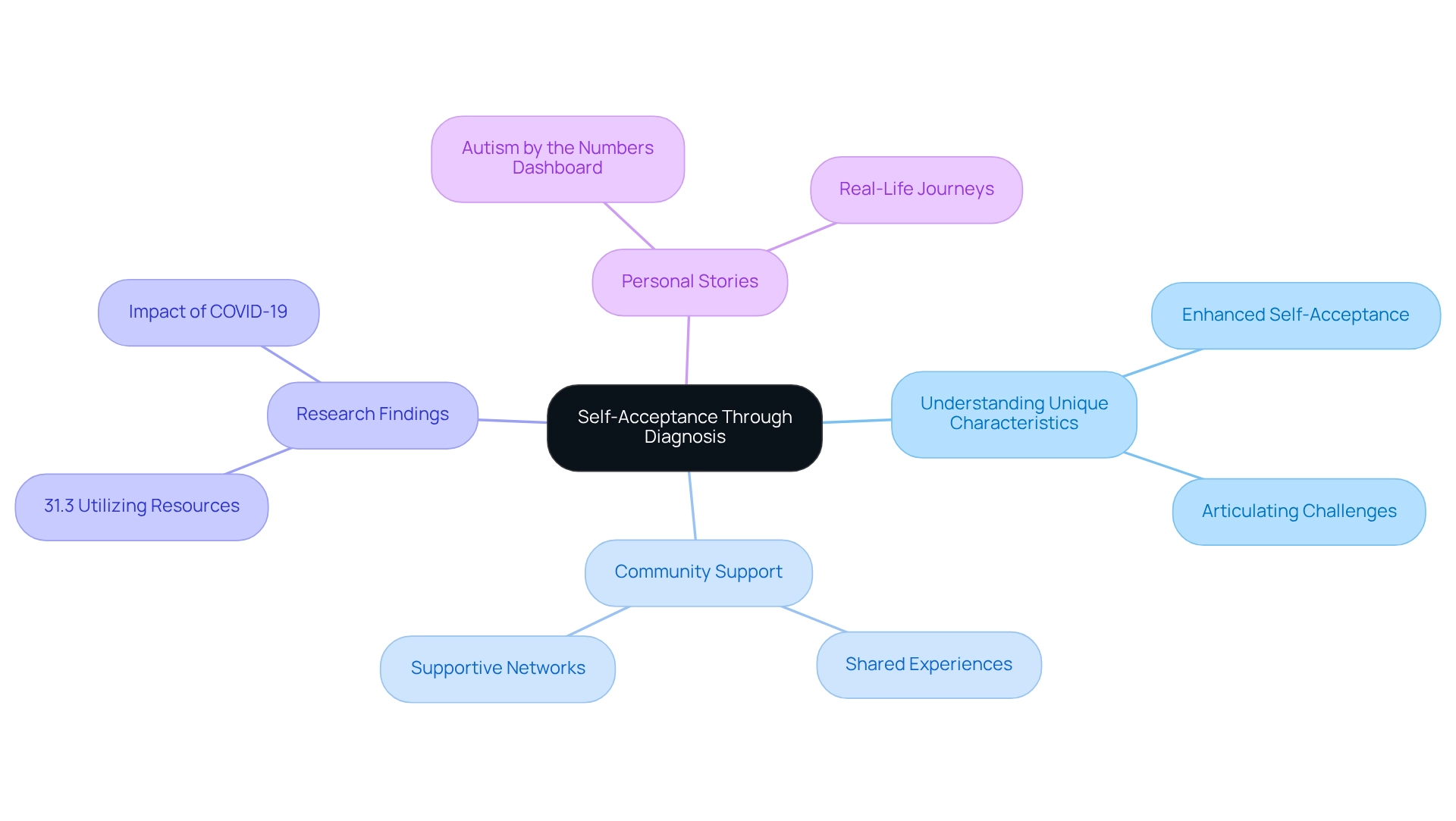
Pro: Connect with Other Autistic Individuals for Support
Receiving a diagnosis for autism can be a pivotal moment, as it opens pathways to connect with other autistic individuals and fosters a supportive network. Many find solace in assistance groups and online communities, where they can share their experiences, challenges, and victories. These connections are vital, as they not only provide emotional support but also cultivate a sense of belonging, essential for mental health and personal development. Research indicates that 78.8% of school-age autistic children thrive in at least one developmental area by age 10, underscoring the positive impact of community engagement. Specifically, these community ties can enhance social skills and emotional resilience, contributing to this success rate.
Furthermore, the increasing volume of peer-reviewed articles on autism reflects a growing awareness of the importance of these connections. However, parents often express concerns about future planning for their children, highlighting the critical role of social workers in assisting families. Social workers can help break down the planning process into manageable steps, alleviating anxiety and offering essential assistance. As one autistic individual noted, "Having a community that understands my journey has been invaluable; it gives me strength and hope for the future."
By nurturing community connections, autistic individuals can improve their well-being and navigate their journeys with increased confidence and assistance. Additionally, ASD Media's sister company offers services in Massachusetts, Indiana, Arizona, and Georgia, providing further resources for families seeking assistance.
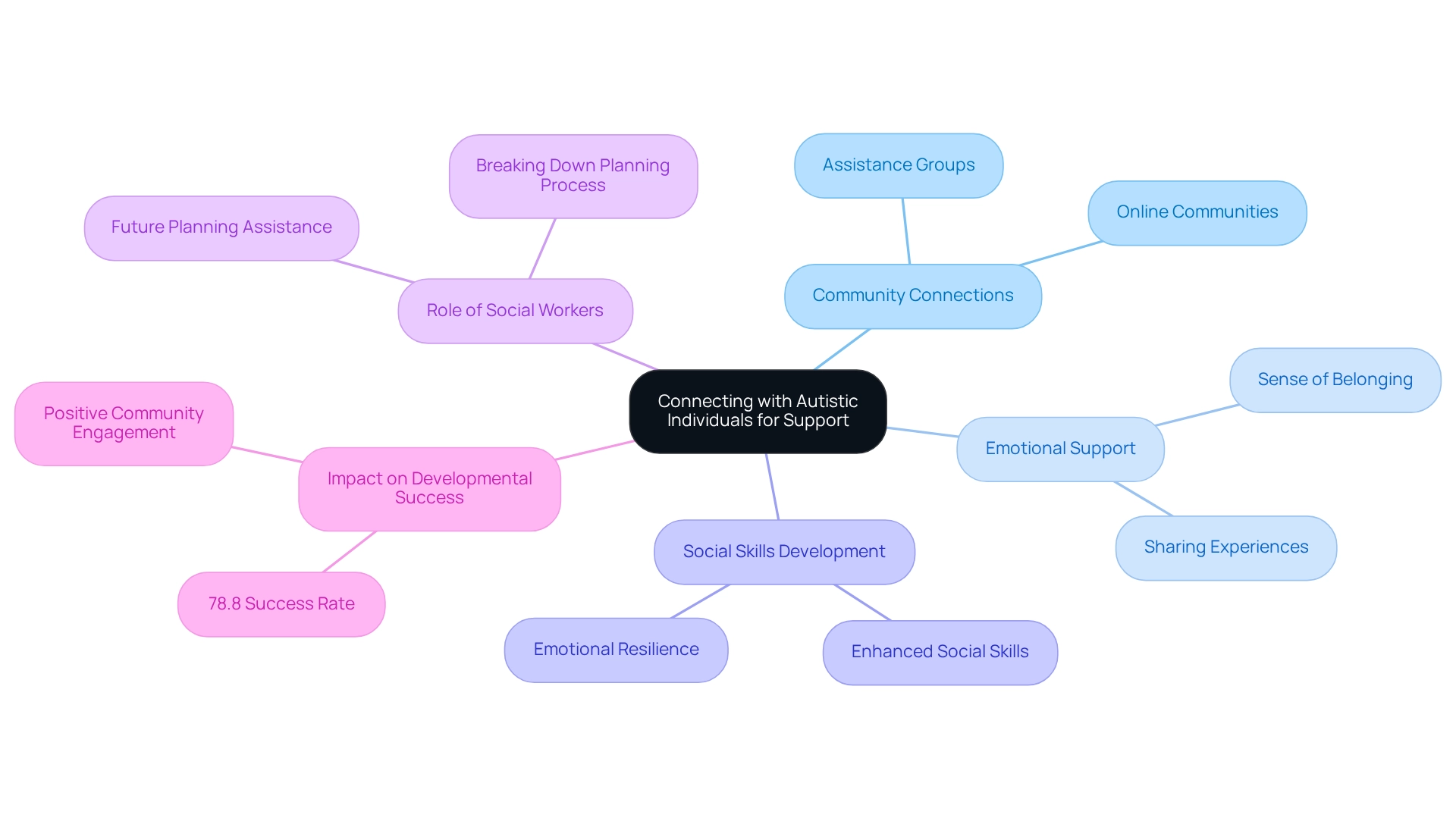
Pro: Gain Access to Support Services and Accommodations
A condition assessment serves as a vital entry point to essential assistance services and adjustments that are crucial for individuals on the autism spectrum. These services encompass:
- Educational assistance
- Therapeutic interventions
- Workplace adjustments specifically tailored to meet individual needs
With a formal diagnosis for autism, families can advocate more effectively for the resources necessary to navigate the unique challenges associated with it. For instance, educational adjustments like individualized education plans (IEPs) can significantly enhance the learning experiences of autistic students, ensuring they receive the resources needed to thrive academically.
Statistics indicate that access to assistance services improves markedly after a diagnosis for autism, highlighting the importance of formal acknowledgment in securing these vital resources. Advocacy initiatives have shown that when families are equipped with the right information and support following a diagnosis for autism, they can drive meaningful change within their communities, fostering a more inclusive atmosphere for all individuals with developmental disorders.
As O. Ivar Lovaas wisely stated, 'If they can't learn the way we teach, we teach the way they learn,' underscoring the necessity for tailored educational approaches. Furthermore, case studies reveal how successful advocacy has led to increased availability of assistance services, reinforcing the critical role of identification in obtaining essential resources.
As Megan Hull notes, 'As additional knowledge is gained about ASD, treatment techniques enhance,' emphasizing the ongoing development of support strategies that benefit individuals affected by the condition.
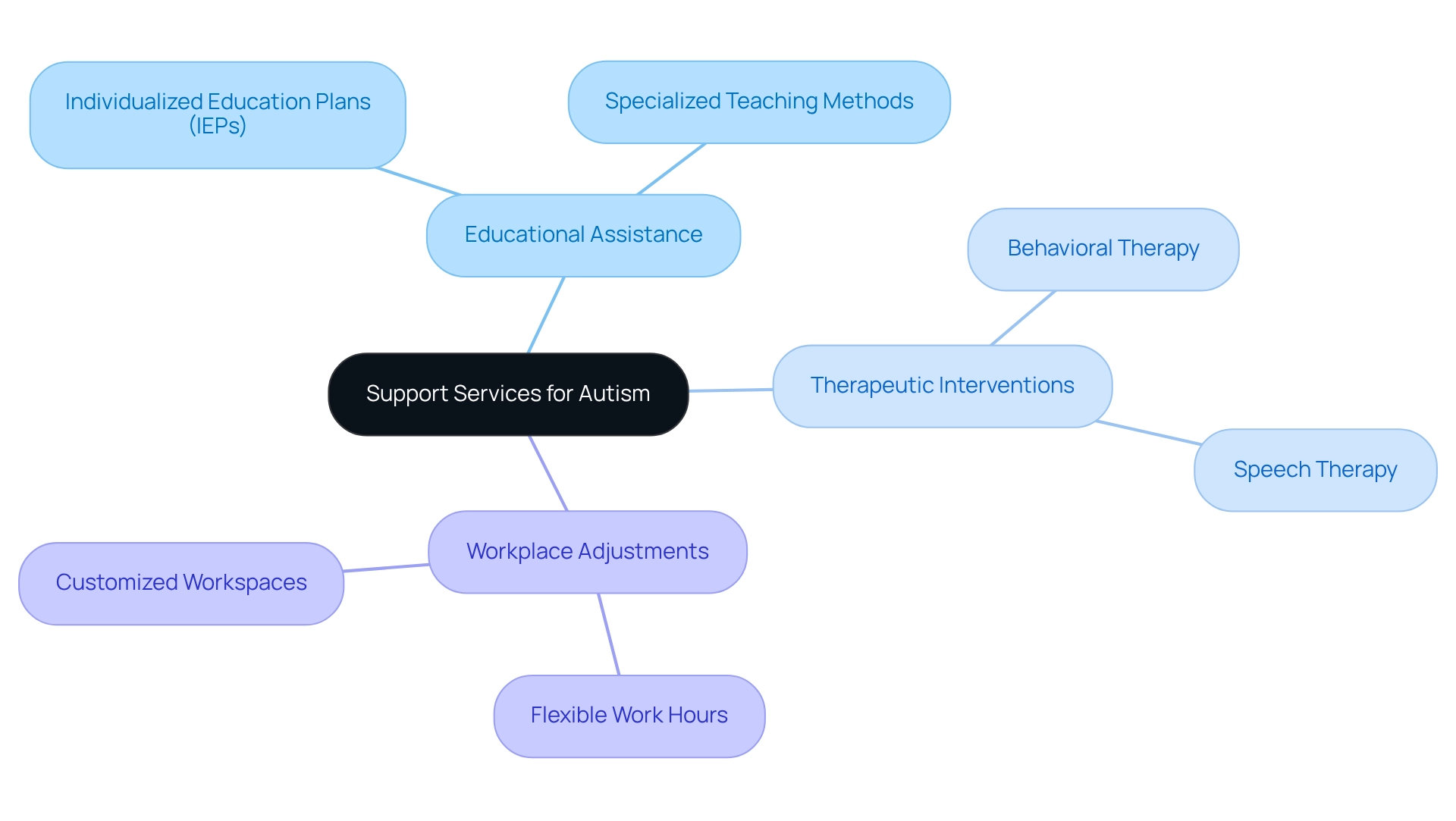
Con: Consider the Financial Costs of Diagnosis
The financial strain of acquiring a diagnosis for autism is a significant concern for many families. The costs for diagnostic assessments for a diagnosis for autism can range from several hundred to over a thousand dollars, with some evaluations costing as much as $1,200, as shared by a parent in Texas. This variability in costs often hinges on the complexity of the evaluation and the professionals involved. Such economic pressure can discourage families from seeking a diagnosis for autism, which can lead to delays in obtaining crucial assistance and resources.
Moreover, the choice of assessment tools plays a vital role in determining overall costs. While standardized tools are essential for accurate evaluations, they can also contribute to the financial burden. The selection of these tools, influenced by the child's age and abilities, directly impacts the evaluation's cost. Families are encouraged to engage in open discussions with professionals about these tools to foster transparency and understanding.
Many families report feeling stressed by the financial implications of evaluations, which can exacerbate the challenges they face in accessing support. Community resources, such as local non-profits and financial aid programs, are crucial in ensuring that evaluations remain accessible to all families, helping to alleviate some of the financial pressures associated with the assessment process. Ultimately, understanding these expenses and the available assistance can empower families to navigate the complexities of autism and the diagnosis for autism more effectively. As ASD Media emphasizes, 'Accurate results are necessary to receive an accurate diagnosis for autism,' highlighting the significance of proper evaluations in light of financial considerations.
Con: Address Inaccessibility in the Diagnostic Process
The process of obtaining a diagnosis for autism can be a daunting journey for many families, often hindered by significant inaccessibility issues such as prolonged wait times, a shortage of qualified professionals, and geographical disparities in service availability. Families across various regions report wait times that can stretch for months, with some areas experiencing delays nearly double the national average. This absence of prompt identification is critical; early intervention is essential for effective support and improved outcomes. Moreover, total medical expenses are roughly twice as high for children with an extended time to identification compared to those with a brief time, underscoring the financial burden on households.
Navigating this convoluted system can leave families feeling frustrated and unsupported, as they often face long periods without necessary assistance. A recent survey of 1,004 specialty centers for developmental disorders across the U.S. revealed that many households encounter obstacles that complicate their path toward obtaining a diagnosis for autism and treatment. Notably, responses from 111 specialty centers across 38 states highlight the widespread nature of these issues and the diversity of practices among these centers, indicating a pressing need for systemic improvements in the diagnosis for autism care.
Experts emphasize that addressing these accessibility problems is vital for enhancing the overall healthcare experience for families dealing with a diagnosis for autism. As one specialist noted, "This can be done in a cost-effective manner that's good for morale and improves providers’ personal satisfaction—especially if the work is done in a way that clearly advances goals related to diversity and equity." Additionally, Ralph Moller stated, "These criteria help in identifying the core features of ASD, including impaired social interactions and deficits in communication," reinforcing the importance of an accurate diagnosis for autism in the face of these challenges. The implications of these accessibility issues are profound, as families often feel overwhelmed during a critical time in their child's development. Addressing healthcare expenses is also crucial for improving access to necessary services for individuals on the autism spectrum.
Con: Beware of the Risks of Misdiagnosis
Misdiagnosis poses a significant risk in the diagnosis for autism and other developmental disorders, especially since symptoms often overlap with conditions like ADHD and anxiety disorders. This confusion can lead to unsuitable treatments and deprive individuals of vital support. For example, children on the spectrum may exhibit obsessive interests, adhere to specific routines, and respond unusually to sensory stimuli—behaviors that can easily be mistaken for other disorders. Alarmingly, statistics reveal that misdiagnosis rates in autism assessments can be as high as 30%, underscoring the urgent need for families to recognize the signs that are crucial for an accurate diagnosis for autism.
Comprehensive evaluations are essential, as they must encompass the full range of an individual's experiences and behaviors. Psychologists emphasize that thorough assessments can help prevent the pitfalls of misdiagnosis, ensuring that individuals receive the appropriate support and interventions they need. As researcher Sara Meyer points out, "The Autistic community accepts self-diagnosis as valid and recognizes the immense capacity of Autistic people to understand and define their own identities." By advocating for detailed evaluations and validating self-assessment, families can navigate the complexities of identifying developmental disorders more effectively and secure the necessary resources for their loved ones.
Moreover, the importance of community support cannot be overstated; it plays a vital role in helping families understand and cope with the challenges associated with developmental conditions. Together, we can foster an environment of understanding and compassion, empowering each other on this journey.
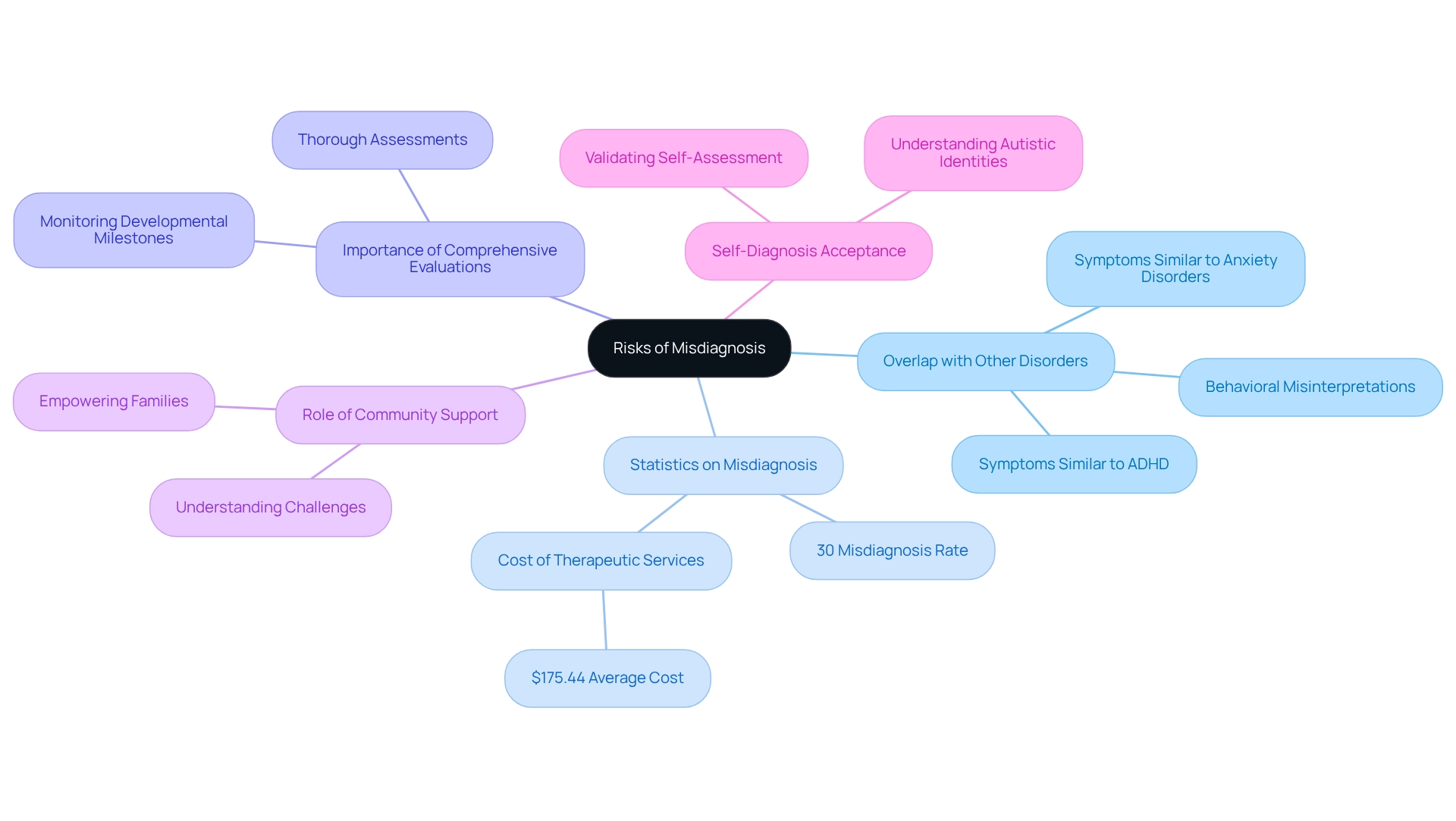
Con: Navigate Negative or Mixed Emotions Post-Diagnosis
Receiving a condition assessment can evoke a complex array of emotions in households, ranging from relief to confusion and profound grief. Many parents find themselves mourning the loss of the 'ideal' child they had envisioned, grappling with the reality of their new circumstances. This emotional upheaval is not unusual; research shows that caregivers of children with developmental spectrum conditions (ASD) experience a significant decline in both mental and physical health compared to the general population. The emotional impact of a diagnosis for autism can lead to feelings of grief and loss, with numerous parents expressing a widespread sense of uncertainty about what lies ahead. Managing these complex emotions is essential for households embarking on this journey. Engaging with support groups or mental health professionals can provide invaluable assistance, helping parents process their feelings and develop coping strategies. For instance, a study on education and training for caregivers highlights how equipping relatives with knowledge about ASD and effective behavior management can alleviate some of the emotional burdens they face. By nurturing a supportive community, households can share their experiences and learn from one another, ultimately enhancing their ability to handle the daily challenges related to autism.
Expert insights underscore the importance of addressing both the child's needs and the caregiver's well-being. Personal beliefs about caregiving significantly influence the coping strategies adopted by parents, making it crucial to cultivate a supportive environment that fosters open dialogue and mutual aid. As Mary Banach, an associate professor in social work, observes, the encouragement and assistance gained through the mutual aid process of a support group can be invaluable in helping parents navigate challenging times. By recognizing and addressing the emotional difficulties that arise after a diagnosis for autism, including the common feelings of grief and loss among parents, households can find a path forward that honors their experiences while nurturing resilience and hope.
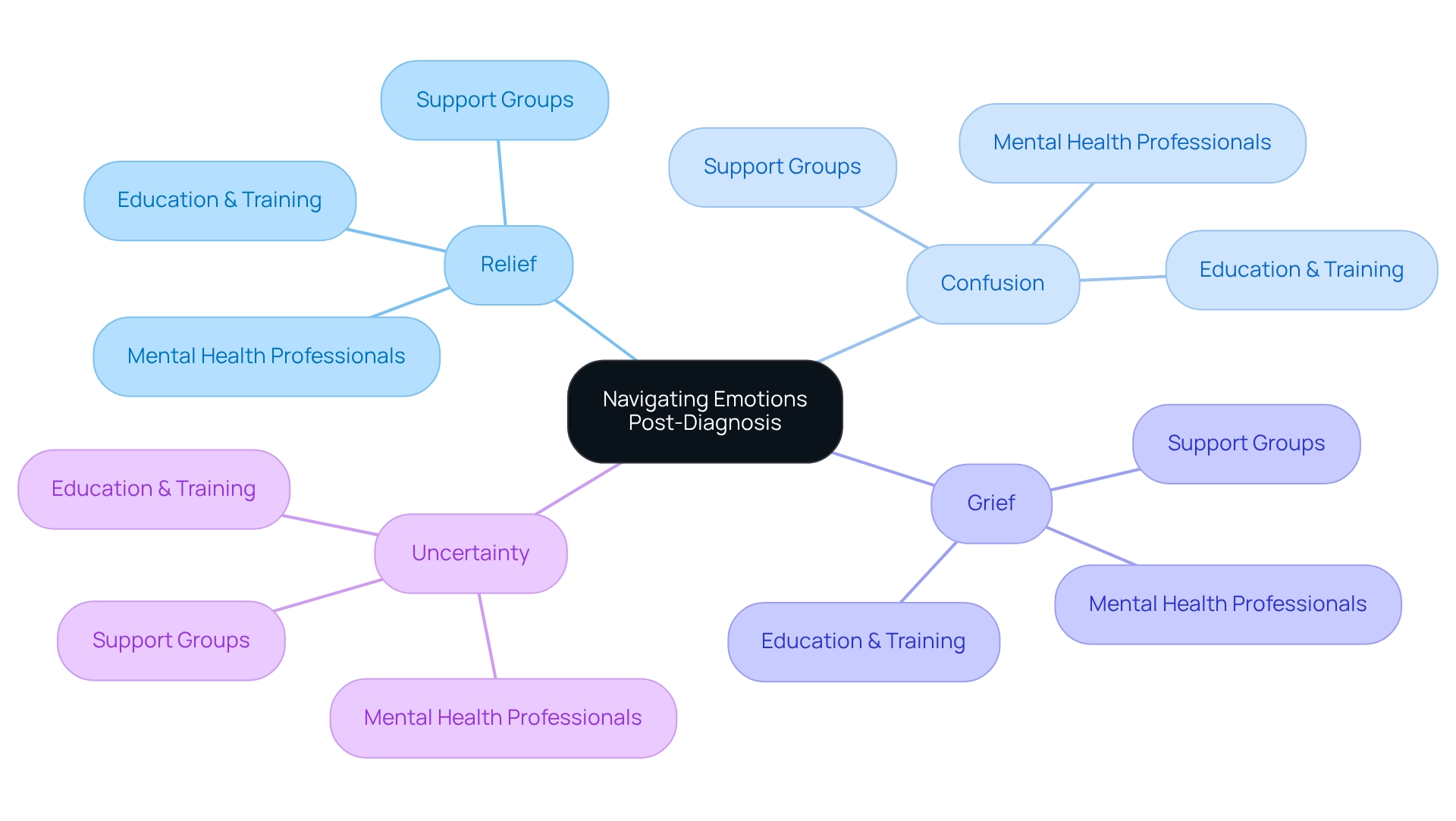
Summary: Weighing the Pros and Cons of an Autism Diagnosis
When contemplating a developmental assessment, families often find themselves navigating a complicated array of advantages and difficulties. Common signs of autism can include challenges with social communication and interaction, repetitive behaviors or interests, and difficulties with sensory processing. On one hand, an assessment can promote self-acceptance and create pathways to vital assistance, which are crucial for navigating the educational and social systems. For instance, studies indicate that 74% of autistic students in the U.S. graduate with a diploma, highlighting the importance of tailored educational resources.
However, families must also weigh the financial implications and emotional challenges that may accompany the assessment process. Research shows that the ASD identification rate among non-Hispanic adults has surged by 286%, reflecting a growing acknowledgment of autism that can lead to increased demand for services and support. As Luke P. Grosvenor, PhD, observes, "Increased identification rates in our data may stem from closeness or collaborations between Native communities and particular MHRN locations, including preferential entry into health systems due to insurance coverage type and/or availability of ASD-specific services."
Families often report mixed feelings about the diagnosis for autism; while many appreciate the clarity it brings, others express concerns about stigma and the potential for labeling. Furthermore, a significant number of autistic individuals are transitioning into adult care, which raises long-term implications for relatives. It is crucial for households to connect with support networks and resources to navigate these complexities effectively.
As proponents stress, knowledgeable decision-making is essential in this journey, allowing households to assess the effect of a condition on their lives and the lives of their children. Moreover, statistics show that numerous families express overall satisfaction after obtaining a diagnosis for autism, which can assist in evaluating the emotional effects of this choice.
Need More Information? Explore Resources for Autism Diagnosis
Families seeking information about developmental disorder assessments can find a wealth of resources designed to support them through this journey. At ASD Media, extensive guides, support networks, and educational materials are available, tailored to meet various needs. For instance, the American Academy of Pediatrics recommends screenings for developmental disorders at 18 and 24 months, underscoring the importance of early diagnosis and intervention for better outcomes. Alarmingly, statistics reveal that the prevalence of autism spectrum condition among children of two or more races is notably high at 22.9%, emphasizing the urgent need for accessible resources.
Moreover, individualized educational plans, such as Individualized Education Programs (IEPs), play a crucial role in addressing the unique challenges faced by autistic students. This is further supported by case studies highlighting the effectiveness of educational assistance. These plans are vital for fostering academic success among neurodiverse learners, ensuring they receive the tailored support necessary to navigate social and communication challenges within educational settings.
Families can also benefit from professional insights on the best ways to gather information regarding developmental assessments, empowering them to be well-informed about available resources. As Yolande Loftus pointed out, recent studies have highlighted disparities in ASD prevalence, with significantly higher rates among Hispanic and non-Hispanic Black children compared to their non-Hispanic White counterparts. Engaging with groups focused on the diagnosis for autism assessment not only provides essential information but also fosters a supportive community where families can share experiences and strategies. By utilizing these resources, families can deepen their understanding and approach the diagnosis for autism process with greater confidence. It’s important to remember that you are not alone on this journey—together, we can navigate these challenges and ensure that every child receives the support they need to thrive.
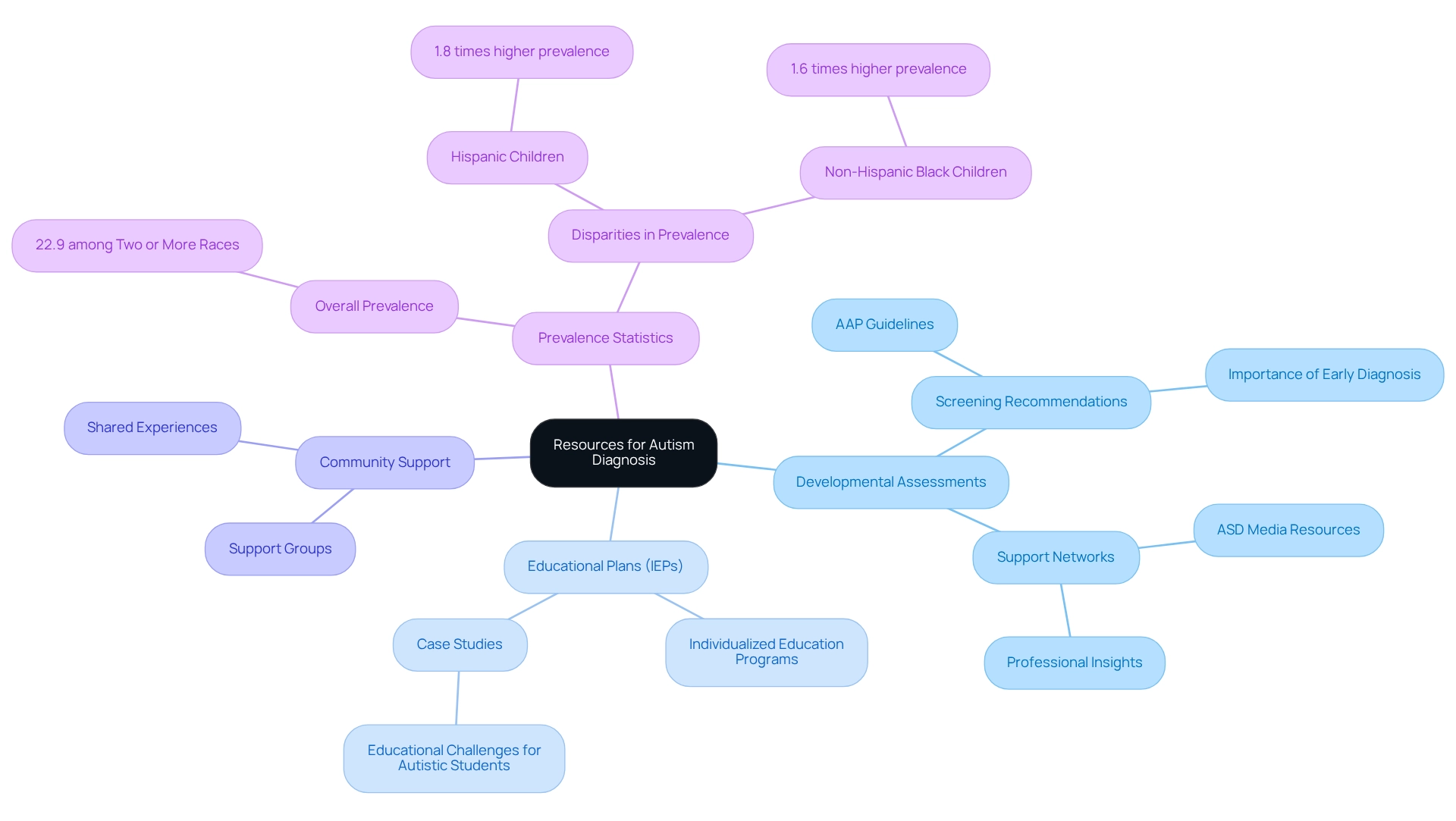
Conclusion
Navigating the journey of an autism diagnosis is both an opportunity and a challenge, shaping the experiences of individuals and families in profound ways. On one hand, receiving a diagnosis can lead to a deep sense of self-acceptance, empowering individuals to embrace their unique traits and connect with supportive communities. Access to essential resources, therapies, and accommodations can significantly enhance the quality of life for autistic individuals, fostering a sense of belonging and opening doors to tailored educational support.
However, this journey is not without its hurdles. Families often face financial implications that can act as barriers to obtaining necessary evaluations and interventions. The inaccessibility of services, exacerbated by long wait times and a shortage of qualified professionals, can delay critical support, potentially impacting long-term outcomes. Misdiagnosis is a significant concern; overlapping symptoms with other conditions can lead to inappropriate treatments and a lack of essential support.
Ultimately, the decision to pursue an autism diagnosis necessitates careful consideration of both its benefits and challenges. Families are encouraged to engage with support networks and utilize available resources to navigate this complex landscape effectively. By fostering open dialogue and seeking informed guidance, individuals and families can better manage the emotional and practical implications of diagnosis, paving the way for a more hopeful and empowered future. While the journey may seem daunting, with the right support, it can also be transformative.
Frequently Asked Questions
What is the mission of ASD Media?
The mission of ASD Media is to enhance the application of ABA therapy by providing essential resources and insights for parents and professionals navigating the autism diagnosis process, while cultivating a supportive community for sharing experiences.
Why is timely intervention important for autism?
Timely intervention is vital for improving outcomes for autistic individuals, as there is a significant gap between the average age of diagnosis (around 2 years) and the onset of intervention (approximately 4.7 years).
How does ASD Media support parents of autistic children?
ASD Media offers a wide array of resources designed to empower parents as they navigate the complexities of developmental disorders, ensuring they have the tools necessary to assist their children.
What role does community support play in ABA therapy?
Community support is crucial for building trust and enhancing the effectiveness of ABA therapy, as understanding family dynamics can influence retention rates in therapy.
How does receiving a diagnosis for autism affect individuals?
Receiving a diagnosis can lead to enhanced self-acceptance, providing individuals with a framework to understand their experiences, and fostering a supportive community for sharing challenges and victories.
What impact does community engagement have on autistic individuals?
Community engagement can improve well-being, enhance social skills, and contribute to emotional resilience, with research indicating that many school-age autistic children thrive in developmental areas by age 10.
How can social workers assist families of autistic children?
Social workers can help families navigate future planning by breaking down the process into manageable steps, alleviating anxiety, and providing essential support.
What resources does ASD Media's sister company offer?
ASD Media's sister company offers services in Massachusetts, Indiana, Arizona, and Georgia, providing further resources for families seeking assistance.




